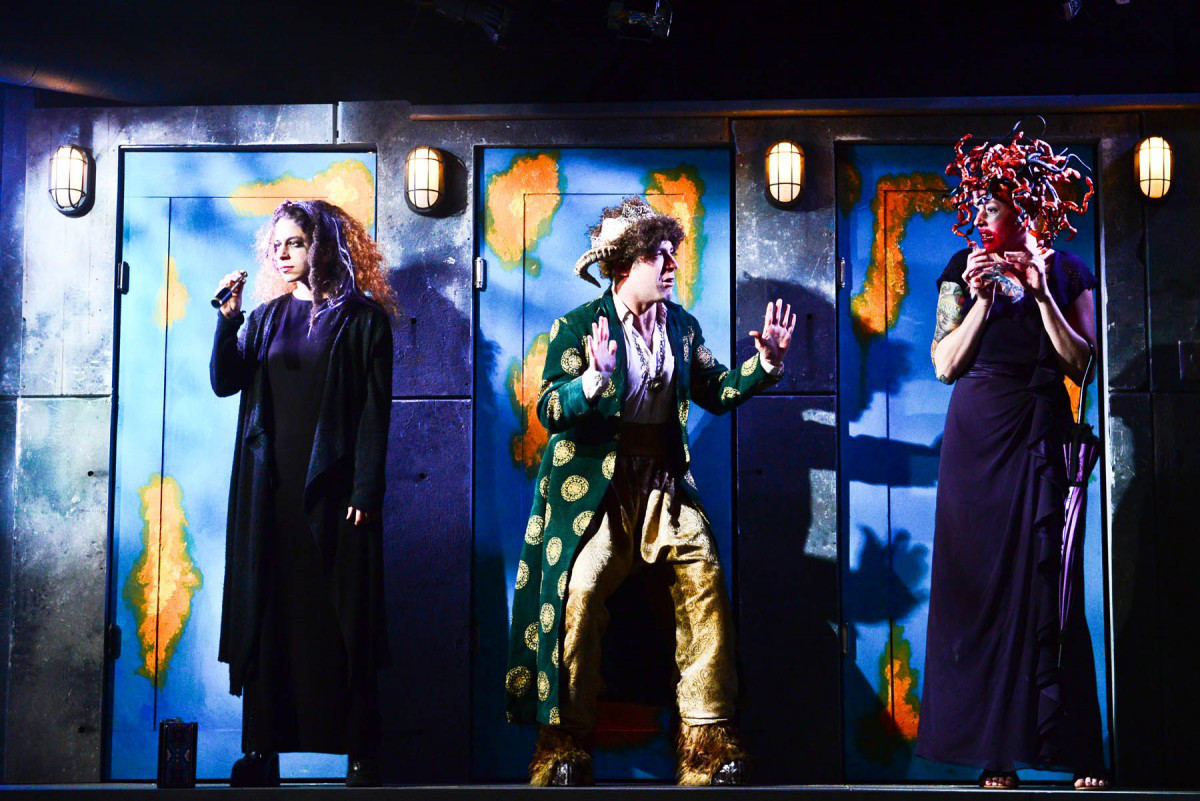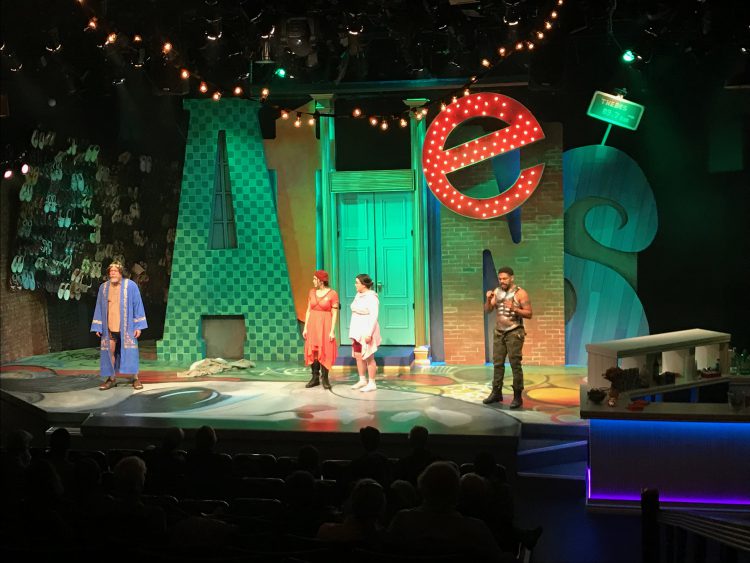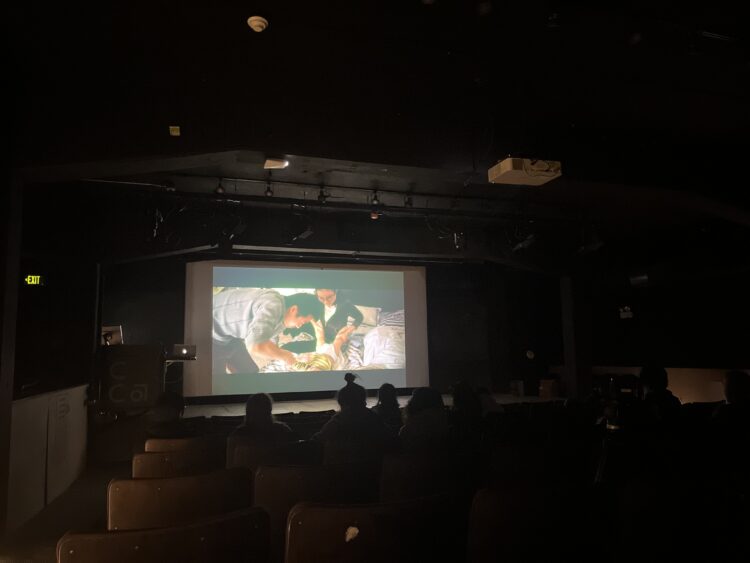Sean Graney Makes Greek Theater Fun Again

What’s better than adapting an Aristophanes play to speak to the current political moment? How about adapting all 11 of them! For his Creative Capital project, The Aristophanesathon, Sean Graney has updated, adapted, and synthesized every surviving work by Greek playwright Aristophanes into a three-act, four-hour play. As a marathon event, Graney offers long intermissions, snacks, a full meal where the audience is encouraged to discuss the work, and easy access to alcohol. The work premieres at the Chopin Theater April 15 – May 27 in Chicago.
We spoke to Sean the morning of his first preview to find out more about the show.
Alex Teplitzky: What is The Aristophanesthon?
Sean Graney: It’s a four-hour marathon of all the eleven surviving Aristophanes plays. Basically, I’ve been doing a lot of work combining Greek plays together. The first thing I did was combine all the Sophocles plays in 2010. Then, I did this thing called All Our Tragic, which combined all the tragedies—and there’s 32 of them—into this twelve-hour long play. So, Aristophanes was the last stop for my love of combining Greek plays together. I’ve been fortunate enough that audiences seem to enjoy them, even though they’re longer.
It seems counterintuitive that contemporary audiences would like a marathon experience. I’ve been finding that for the most part people are really hungry and excited for it. I’m very lucky to be working on this.
Alex: You have a special knack for this kind of stuff. You’ve said you want your adaptations to feel like they were written this morning, and that you want to create in-house communities for the duration of the play.
Sean: Absolutely. I have such a love for classic theater, but in a lot of productions, and even just reading it, it can appear very stuffy and dated. I find them relevant and exciting, so my goal is to figure out how to show my love for these plays in a very contemporary way. I want to show the audiences that we’re still dealing with the problems addressed in these plays, they are still relevant in a certain way. I want to highlight the relevancy and knock out the things that get in the way of the excitement of it.
The Greek plays were written to be part of these day-long festivals. The audiences saw a bunch of plays together, and they eat and they drink. Then they sit around and talk about the plays after they see them. That was the part of the whole experience of it, that the plays themselves were not the end-all be-all of the audience’s experience. So, I want to bring that social aspect back into our understanding of these plays.

Alex: What does that look like in The Aristophanesathon?
Sean: We have longer intermissions, there’s a bar so people can get drinks easily, there’s snacks around all day. During the longer breaks we serve food to people so they can eat a meal together and talk about what they just saw. The audience is encouraged to sit on stage and eat during intermissions. We just try to create a loose environment where the actors are aware of the audience and are directly communicating to the audience.
Alex: What is it about the Aristophanes plays that makes them relevant to today’s audience?
Sean: Aristophanes wrote plays that were directly about his society, and directly about the politics that Athens was dealing with at the time. Part of the understanding of the plays was knowing what was going on—so making it relevant for today, I had fun translating the issues Aristophanes addressed to what’s going on in America right now.
His plays thrive when they speak to the moment that the audience is living through. I think that’s where his strength is, but it’s also why all of his plays aren’t as appreciated as much—he was really writing for a specific time.
It’s sort of like watching an episode of Saturday Night Live or The Daily Show from 15 years ago: it won’t be as funny as the more recent episodes. That’s sort of how Aristophanes plays are. He was writing specifically for the time he was living in.
Alex: What was going on in Athens at the time?
Sean: Oh, Athens was involved in the Peloponnesian war with Sparta. It was a devastating, horrible war, and there was a lot of politics involved with it. There was this one general Cleon who Aristophanes really, really hated. Basically, he was this man who seized a lot of power without being elected. He was in a position and took advantage of it. Cleon was a big promoter of the Peloponnesian war. A lot of Aristophanes plays are directly about being in the society that Cleon was trying to establish.
It gets tricky because Aristophanes was very wealthy. His main thing about the war was that it was so expensive. It’s funny that (mostly because of Lysistrata) we often associate Aristophanes with anti-war sentiments. It’s true that he was definitely anti-war, but not for the same reasons that today people tend to be anti-war.
Alex: Lysistrata is the one Aristophanes play I think everyone knows—the comedy about women who refuse to have sex with all men until they negotiate peace. But you are working with all these other plays I had never heard of: The Frogs, The Clouds, The Birds. Which one is your favorite?
Sean: That is a really good question! Let me think about this.
I ended up breaking them all apart and putting them together. So there are three acts in The Aristophanesathon. The first act includes three plays, for instance. I break them all apart into themes, and then put them together like a Shakespearen comedy where you have plots and subplots weaving in and out. You’re not just following one story to another story. It’s codified through a certain group of characters living through all eleven plays that overlap and intermingle.
With Aristophanes plays you’re dealing with themes that come up over and over again, like with Plutus or Wealth. In that play, people are trying to overturn the system of government in Athens and try to establish a more socialist government without private property. You’re dealing with the same theme in the play Ecclesiazusae (which is hard to spell and harder to pronounce)—but basically women do it, and that’s the only difference. So I tried to look at the points where the plays overlap and say the same thing. I try not to say the same thing several times.
But what is my favorite play?
Alex: I was going to say: you didn’t answer the question, damn it!
Sean: [laughs] I know! I think The Frogs is pretty funny. It’s so hard to say… no, I would say The Frogs.
Alex: You must be an expert in Aristophanes now?
Sean: No, I am not claiming that. I hadn’t even read all eleven plays when I first started, I had read maybe five at the most. As I’ve been reading and getting to know them all, it wasn’t necessarily looking at each play as if I was directing each play. It was about knowing what my tropes were to conjoin each play, looking for places for them to come together. As far as Aristophanes experts, there are brilliant people out there who have written amazing books on him. I am not an expert by any measure!
I could tell you what each play was about, but actually I changed most of the characters’ names, so I can’t even tell you what their names are.
Alex: Still, for an audience that probably knows little about Aristophanes, this is like a history 101 course for them. And at the same time, you give them the chance to sit down and talk to one another in the middle of it and say, “hey this reminds me of what’s going on in the White House right now,” or something like that, right? There’s the opportunity for it to turn into a larger discussion.
Sean: Hopefully! You don’t have to know Aristophanes to enjoy it, but if you do there are some Easter eggs in there for you that are really funny. Also, Aristophanes made fun of Euripides an awful lot, so there are a lot of inside jokes about him. It won’t bog down the show if you don’t know all this trivia, but it’ll just make it more enjoyable for people who do. And there are references for people who watched All Our Tragic that are hopefully funny.
Alex: You have these six principles that you guide yourself by in creating theater work: Inspire, Entertain, Surprise, Spread Joy, Share Pain, and Listen and Respond. I know you haven’t started The Aristophanesathon yet, but what are some of the impacts of following those principles in your past work? Do you ever hear years later people telling you, “We met at your show and we’re still dating!” Or that email listservs are formed after?
Sean: I don’t hear about email listservs, but I definitely hear about people coming together for the show. One story that comes to mind is a woman who saw the show with her father, and it was one of the last experiences she had with him before he passed away. So it always stuck with her. All Our Tragic ended up being very impactful for a lot of people, and I do often hear about it, which is nice to know how much it meant to people.
Alex: Your Creative Capital Retreat presentation is one of my all-time favorites! It’s informative about the project, but it’s also funny, and gives the vibe of what your trying to go for in your work. How was Creative Capital helpful to the project?
Sean: That’s so kind, thank you so much!
Creative Capital is really amazing. Even outside of the project, I got to meet just amazing people, be a part of this really great organization, and feel like I had some place to go if I had any questions. It was really rewarding.
On top of that, to have the money, I could say no to certain works so I could concentrate on this project. It was so helpful and beneficial. Any time I wanted to get a workshop together, I could. I had enough freedom with Creative Capital to gather a mass of people, rent out a theater space, buy some food and do a workshop of it. That’s incredible. The project could not have happened without Creative Capital. It’s an amazing organization.
I actually workshopped this project in four difference cities. With Creative Capital’s help I was able to go to a new group of people, some I knew a long time, some I hadn’t met before, some were students, some were professional actors. It was this great opportunity to put the work in the hands of a bunch of different people with a bunch of different perspectives. I learned a lot from the people saying their lines, and hearing their feedback.
This was the first time I had the mobility on my own and not have to beg people to let me come to their university. It was easy to be mobile because I didn’t need to rely on organizations, or universities, or theaters for support. I could just show up and be like, “I have this play, and just give me some actors, and we’ll put it together.”
Alex: You had a unique strategy for developing the work, where you sold tickets in a hybrid fundraiser/ticket sale ahead of making the work.
Sean: Yeah, with my theater company, The Hypocrites, we research developed this thing called “ticket-pledges.” The show was going to happen, whether with my theater company or another entity. There was a lot of things up in the air, but I really wanted to get this project done by April 2018. We tried this new model of ticket-pledges where we reduced the budget for the show to make it as cheap as possible with everyone still getting paid. Then we figured out exactly how many tickets we had to sell—so if we can sell or get pledges for 2,000 tickets by this date, then the play can happen. It was really successful in a lot of ways, but we learned a lot to make it better in the future.
I didn’t want to use crowdfunding platforms. I wanted to show that transactional art is not a bad thing, necessarily. Especially for theater—maybe it’s different with other art forms—with things you are charging admission for, it’s already a commodity. You can make it a transaction, rather than philanthropy. It can be transactional philanthropy. People in the kindness of their heart will buy a ticket a year and a half in advance, rather than giving you $120, they’ll just buy two tickets and come to the show.
I wanted to stress that because nonprofit theaters in America, especially mid-sized ones like my organization is, are going through a crisis. The money is drying up, and it’s really hard to get donations, and it’s really hard to sell tickets. This is one proposal for a solution for once in a while giving for a show: see if people are interested in coming to the show before you program it.
The Aristophanesathon is playing at Chopin Theater in Chicago through May 27. Purchase tickets here.
